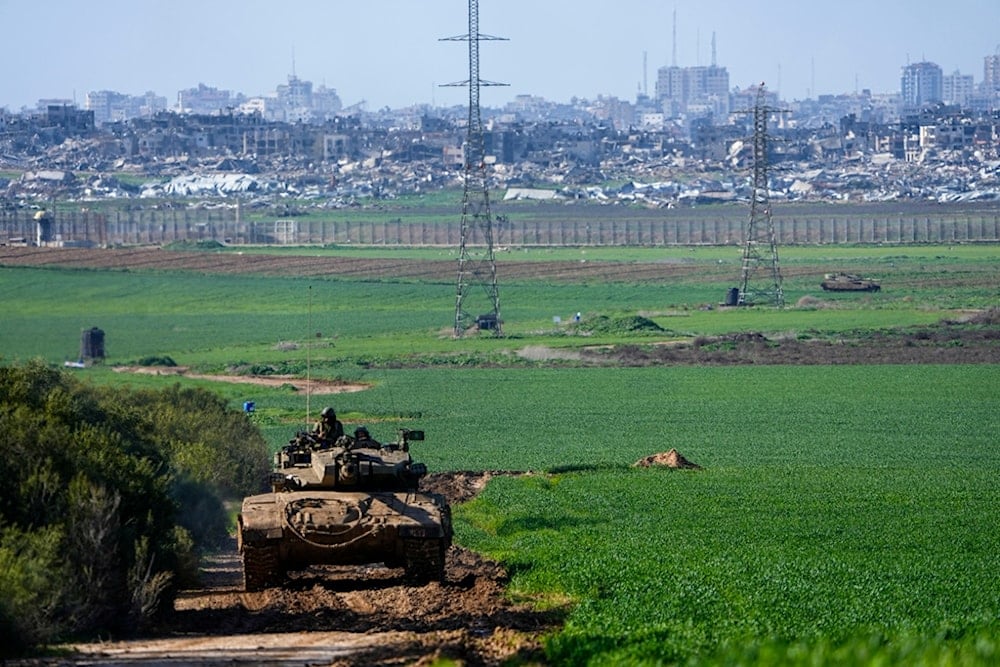Israeli economic growth faces substantial slowdown in 2024: IMF
Several sectors, especially in consumer activities, have experienced a decline, compounded by a shortage of workers as hundreds of thousands were called up as army reservists.
-

An Israeli tank drives to a position on the separation fence with the Gaza Strip, as seen from southern occupied Palestine, Tuesday, Jan. 30, 2024 (AP Photo)
The International Monetary Fund (IMF) on Tuesday expressed concerns over "Israel's" economic growth as it anticipates a significant slowdown in 2024 due to the prolonged war on Gaza.
Chief Economist Pierre-Olivier Gourinchas stated that the Gross Domestic Product (GDP) would increase far less than the pre-war estimate of 3%, and further acknowledged that the specific revised number hasn't been published yet.
As the war drags on, Israeli officials suggest that achieving their goal of dismantling the resistance might take several more months, potentially extending throughout the entire year.
Despite various growth projections, the Bank of "Israel" estimates a 2% growth for 2024, while the finance ministry provides a more conservative figure of 1.6%.
Indicators already point to the economic impact, with the finance ministry noting a probable contraction of around 20% quarter-on-quarter from October to December.
Several sectors, especially in consumer activities, have experienced a decline, compounded by a shortage of workers as hundreds of thousands were called up as army reservists, though many have been released.
Moreover, the fiscal deficit is expected to surge to 6.6% of GDP this year.
Read more: Thousands of businesses in north closed since October 7: Israeli media
Earlier this month, "Israel's" Central Bank governor Amir Yaron said the budget would plateau public debt at an estimated 66% of the gross domestic product for the foreseen years, compared to 2023's 62%.
Yaron also stated that the war on Gaza will cost the Israeli economy 10% of the 530 billion dollar GDP, and revenue will shrink by 2%.
The Israeli Central Bank also made interest cuts last month, reducing them to 4.5% when markets stabilized for a while.
He further noted that unprecedented negative demand for construction was the primary factor for the inflation shock. Yaron stated that in case the genocide financial spillover reintensifies, the bank's monetary policy will have to be more cautious.
Read more: War on Lebanon can be 'lethal' to Israeli economy: Reports
Tapping into the Indian workforce
A report by The Washington Post issued a week ago revealed that "Israel" is seeking to address the labor shortage by hiring tens of thousands of Indian workers, noting that discussions between "Israel" and Indian authorities regarding recruitment were underway even prior the events of October 7.
Israeli authorities have expressed the hope of bringing about 10,000 to 20,000 Indian migrant workers in the coming months.
This figure equals the total number of foreign workers who entered the country through bilateral agreements in 2021, according to "Israel's" Center for International Migration and Integration (CIMI).
"India will be one of, if not the, largest supplier of building workers in Israel in the coming years," said Shay Pauzner, the deputy director general of the "Israel" Builders Association, noting that approximately 5,000 workers from New Delhi and Chennai have already been confirmed.
Pauzner added that his association turned to India precisely because of the regime's deicision to suspend Palestinian workers permits.
Nearly one-third of the workforce in the Israeli construction sector was comprised of Palestinians, but with the outbreak of the war, work permits for individuals from Gaza and the occupied West Bank were suspended.
"Right now we are looking for any way to close this gap. We are under a lot of pressure," he said.

 4 Min Read
4 Min Read








